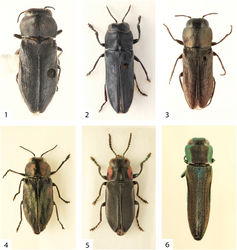Anthaxita peruviana
| Notice: | This page is derived from the original publication listed below, whose author(s) should always be credited. Further contributors may edit and improve the content of this page and, consequently, need to be credited as well (see page history). Any assessment of factual correctness requires a careful review of the original article as well as of subsequent contributions.
If you are uncertain whether your planned contribution is correct or not, we suggest that you use the associated discussion page instead of editing the page directly. This page should be cited as follows (rationale):
Citation formats to copy and paste
BibTeX: @article{Bílý2013ZooKeys304, RIS/ Endnote: TY - JOUR Wikipedia/ Citizendium: <ref name="Bílý2013ZooKeys304">{{Citation See also the citation download page at the journal. |
Ordo: Coleoptera
Familia: Buprestidae
Genus: Anthaxita
Name
Anthaxita peruviana Bílý, 2013 gen. n., sp. n. – Wikispecies link – ZooBank link – Pensoft Profile
Type locality
Peru, Cusco.
Type specimen studied
Holotype (female, NMPC): “Pérou (Cusco) Gay 59–49”.
Diagnosis
Medium-sized (5.4 mm), black-bronze, matt with silky lustre (Fig. 1); clypeus and anterior portion of frons with weak, violet lustre; ventral surface lustrous, black-violet; entire dorsal surface asetose, ventral surface with rather long, sparse, recumbent white pubescence, metepisterna covered with cream-white tomentum.
Description of female holotype
Head wide, large, as wide as width of anterior pronotal margin; clypeus twice as wide as long, separated from frons by shallow, transverse impression, anterior margin widely, shallowly emarginate; frons flat with two shallow, rounded depressions above antennal insertions; vertex flat, 2.8 times as wide as width of eye; eyes relatively small, elliptical, not projecting beyond outline of head; antennae very short, finely serrate from fourth antennomere; scape pyriform, slightly flattened, 3.5 times as long as wide; pedicel suboval, 1.5 times as long as wide; third antennomere weakly triangular, 1.5 times as long as wide; antennomere 4 sharply triangular, 1.3 times as long as wide; antennomeres 5–10 trapezoidal, 1.3 times as wide as long, terminal antennomere rhomboid, somewhat longer than wide; sculpture of head consisting of small, fine, very dense polygonal cells with microsculptured bottoms.
Pronotum almost regularly convex, 2.2 times as wide as long, slightly flattened at posterior angles; anterior margin deeply biarcuate, medial lobe large, strongly projecting forward, posterior margin nearly straight; lateral margins regularly, widely rounded, posterior angles obtuse-angled; prescutellar pit and “agriloid” carina missing; sculpture consisting of very fine, small, polygonal cells, nearly indistinct on pronotal disc. Scutellum (Fig. 31) 1.3 times as long as wide, cordiform, flat, lustrous, microsculptured.
Elytra 2.2 times as long as wide, regularly convex, subparallel, regularly tapering at posterior third; humeral swellings slightly projecting beyond outline of elytra; each elytron narrowly rounded apically, with quite indistinct serrations; subhumeral carina well defined, flat, reaching apical third of lateral margins; elytral epipleura narrow, not very well defined, becoming narrower posteriorly, reaching posterior fifth of elytral margins; elytral sculpture very fine, consisting of tiny, transverse, zig-zag rugae which are much denser on humeral portion of elytra than that on disc.
Ventral surface lustrous, finely ocellate, anal ventrite widely triangular, apically subtruncate, finely serrate laterally. Legs short, stout, all tibiae straight, unmodified; tarsi short, tarsomeres 1–4 rather wide with well defined, ventral, adhesive pads; all tarsi much shorter than corresponding tibiae. Tarsal claws robust, strongly hook-shaped, slightly enlarged at base.
Sexual dimorphism. Male unknown.
Measurements. Length: 5.4 mm; width: 2.0 mm.
Etymology
Anthaxita peruviana sp. n. is named after the country of origin (Peru).
Differential diagnosis
All differential characters are given in the description of the genus.
Distribution
Peru.
Note
The holotype was originally pinned, so the right elytron and corresponding portion of the abdomen are somewhat damaged (see Fig. 1).
Taxon Treatment
- Bílý, S; 2013: A study on the Neotropical Anthaxiini (Coleoptera, Buprestidae, Buprestinae) ZooKeys, 304: 17-47. doi
Images
|

